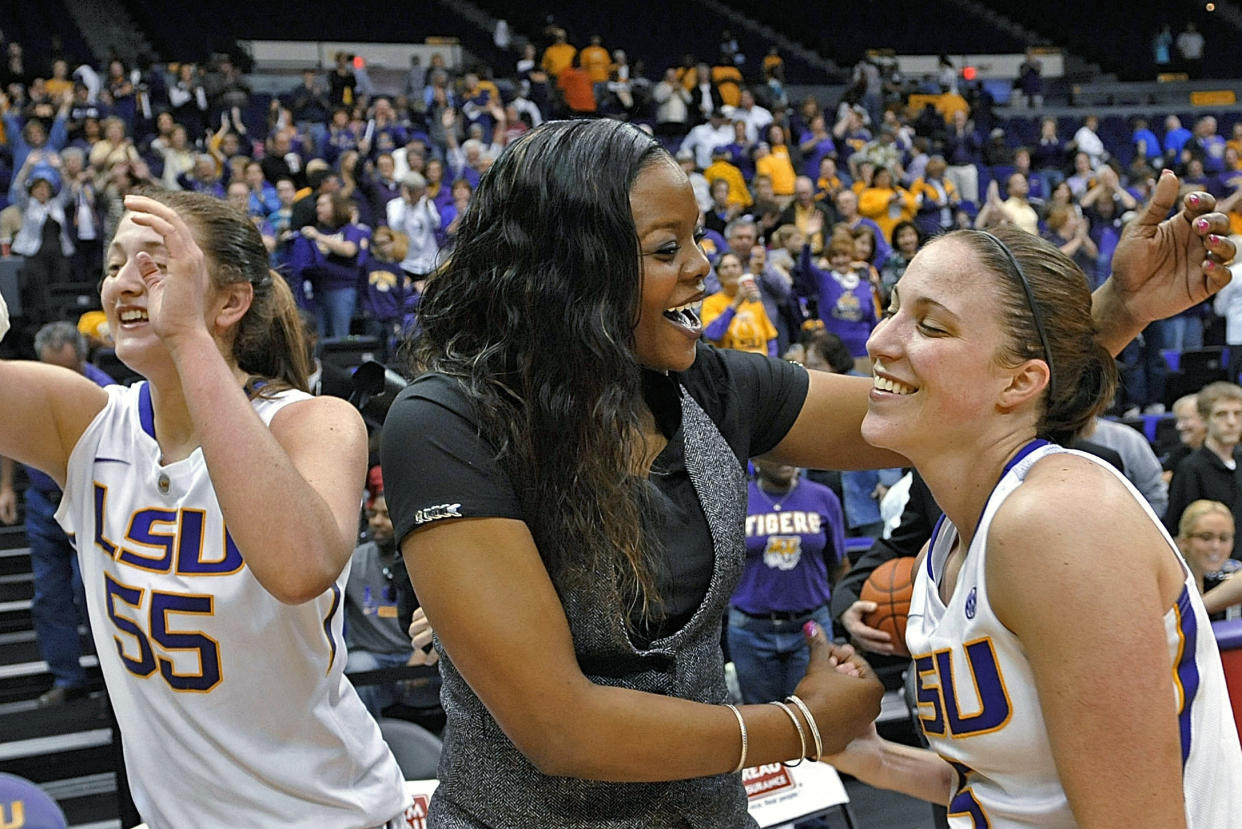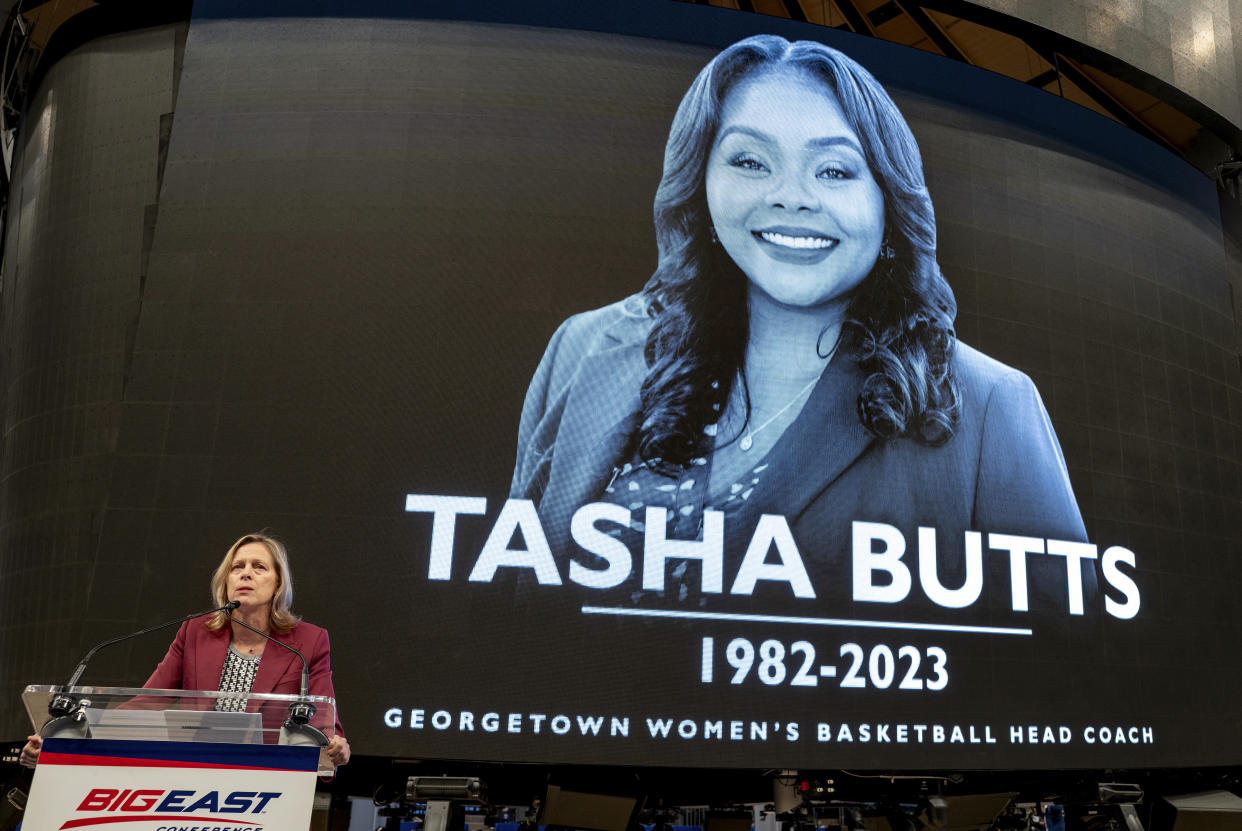Tasha Butts’ death shines light on her ‘Tasha tough’ basketball legacy and the need for equitable breast cancer treatment [Video]

[ad_1]
The women’s basketball world was rocked this week with the news that Georgetown women’s head coach Tasha Butts had died at 41 years old.
Less than two years earlier, Butts had been diagnosed with metastatic breast cancer. She was known for her toughness as a player, first as a Georgia high school standout then as a four-year letterwinner at Tennessee, where she was a key part of back-to-back national runners-up as a junior and senior. Butts was also known as a devoted teammate and friend, the one everyone else counted on when they needed help because they knew Butts would always provide it happily.
Once reluctant to discuss her diagnosis, once she went public Butts was all in, making speeches and helping to raise money for the Kay Yow Cancer Fund, making sure funds were earmarked for the Atlanta hospital where she was treated to ensure that low-income and underserved women who were also fighting could get better care.
The love for Butts spurred a movement, #TashaTough, and #TashaTough Tuesdays, when coaches and teams all over the country posted messages of support for Butts.
Becoming a head coach was her dream, and after three years at Georgia Tech, where she had served as associate head coach under Nell Fortner, Butts was named head coach for the Hoyas earlier this year.
She was with her team for only a few months. In September, Butts took a leave of absence to address her health, but died weeks later. At Big East media day on Tuesday, their loss still so raw, veteran members of the Georgetown team spoke about Butts’ impact.

“She is leaving her legacy,” senior Kelsey Ransom said, pushing back on a question about the legacy Butts left that was phrased in the past tense. “Every single day we go in the gym with a sense of gratefulness and humility and hard work, and that is who she was and that is who we will continue to bring every single time, whether it’s on the floor, into the classroom, into whatever job we work after. So she is continually leaving her legacy on us.”
Interim head coach Darnell Haney was Butts’ second hire at Georgetown, and in reflecting on the woman he knew said, “I talked to our team about this: a lot of people go into this ‘Tasha Tough’ mantra thinking it’s like smashmouth. No. It’s not about that. Being ‘Tasha tough’ is actually being empathetic. Being ‘Tasha tough’ is being tough on the floor but powerful off the floor as well.
“We’re going to bring an exciting style. The girls are going to play with joy. You’re going to see these young women playing with an almost … a joy that coach Tasha would have wanted to see. I think them going out there and them appreciating life and appreciating the ability to be able to do this and do this for a woman that was able to pour into them even though she was going through what she was going through.”
The racial gap in breast cancer treatment
This still being October and breast cancer awareness month, Butts’ death is a sobering reminder how deadly the disease can be even for all of the money raised and advances made in fighting it since the international campaign for breast cancer awareness began over 30 years ago. Especially for Black women.
Despite a slightly lower incidence of diagnosis, Black women are still 40 percent more likely than white women to die from breast cancer, according to the American Cancer Society.
Butts had metastatic cancer, which means it had already spread to other areas of her body and was considered Stage 4 and incurable by the time it was discovered. For Butts, it was back pain that led to the diagnosis. She was 39 when she was diagnosed.
Dr. Oluwadamilola “Lola” Fayanju, chief of the division of breast surgery at Penn Medicine and considered a national leader in the study and treatment of breast cancer, told Yahoo Sports that Black women are more likely to be metastatic when their cancer is discovered, part of the reason why their outcomes can be worse.
“The reasons for that are multi-factorial: even though we [Black women] present at a higher stage, we also may not receive treatment in equitable ways, in terms of always getting all the treatment that’s known to be effective,” Fayanju said. “And there’s also concern that’s even the treatment that’s supposed to be effective, we may not receive it at the full doses.”
The gap in outcomes has widened over the decades, Fayanju said. Before screening mammography was common, rates of survival across all races were similar. Once screening mammography was provided at higher quality to women from majority backgrounds, the mortality gap began to grow.
Because advances usually take longer to become available for lower-income and non-white communities, Fayanju fears the outcome disparity could grow even larger. While Black and non-Black women do get mammograms at similar rates, the quality of the mammogram and the skill of the diagnosticians evaluating them may not be the same; 3-D mammograms have been found to be superior at discovering the disease, but aren’t available at all facilities. Additionally, newer immunotherapy treatments for patients with triple-negative breast cancer, which historically has had fewer treatment options than invasive breast cancer, may not be provided.

There are things that can help Black women and all women to have the best possible outcomes, Fayanju said. If you’re a man and reading this, pass these on to women in your life:
-
Know your breasts, know your body. No one is too young to have breast cancer. Fayanju has treated a 17-year-old patient with the disease. She recommends that if you think you may have an infection or some other malady and it doesn’t respond to treatment within two weeks, you “absolutely” should ask for a biopsy and further testing and not be made to feel badly for doing so.
-
If you’re asked to go back for further imaging, follow through and go. “Some women get afraid and don’t go back, and that’s a huge problem,” Fayanju said.
-
Know your family history in detail and start talking to your gynecologist or primary care physician at an early age. Taking a risk assessment can show if you’re at average or higher risk for contracting breast cancer. If you’re at higher risk, you may need to start screening at a younger age or undergo genetic testing.
-
Take part in clinical trials, which can advance the field, and equitable inclusion in trials will make sure Black women are included in the science that will lead to cures.
-
Don’t think of breast cancer as a death sentence. If you’re diagnosed, believe that you need to pursue standard of care medicine and work with physicians in pursuit of therapy that is evidence-based over therapy that is not evidence-based.
“I recognize that a lot of times women don’t want to pursue things because of concerns about not trusting the health care system and indeed, Black women have a lot of reasons not to trust the health care system, not just for historical reasons but because of how we’re treated right now, every day,” Fayanju said. “Medical mistrust is something that frankly is the fall of the health care system.
“That being said, find doctors you trust, partner with them, take their advice and try to pursue evidence-based care if you’re diagnosed because you really need to try to do all the things to try and get cured.”
As Haney said, being “Tasha Tough” means being powerful away from the basketball court as well. That means advocating for yourself and your health and well-being.
[ad_2]
Source link
